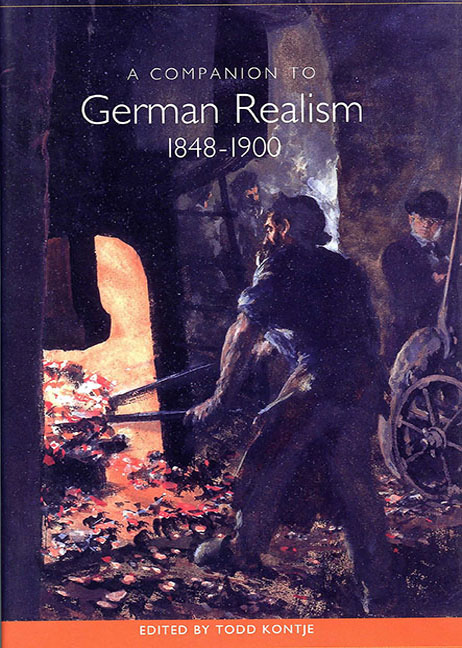Book contents
- Frontmatter
- Contents
- Preface
- Introduction: Reawakening German Realism
- Adalbert Stifter's Brigitta, or the Lesson of Realism
- Mühlbach, Ranke, and the Truth of Historical Fiction
- “In the Heart of the Heart of the Country”: Regional Histories as National History in Gustav Freytag's Die Ahnen (1872–80)
- A Woman's Post: Gender and Nation in Historical Fiction by Louise von François
- Friedrich Spielhagen: The Demon of Theory and the Decline of Reputation
- Wilhelm Raabe and the German Colonial Experience
- From National Task to Individual Pursuit: The Poetics of Work in Freytag, Stifter, and Raabe
- Das Republikanische, das Demokratische, das Pantheistische: Jewish Identity in Berthold Auerbach's Novels
- E. Marlitt: Narratives of Virtuous Desire
- The Appeal of Karl May in the Wilhelmine Empire: Emigration, Modernization, and the Need for Heroes
- Making Way for the Third Sex: Liberal and Antiliberal Impulses in Mann's Portrayal of Male-Male Desire in His Early Short Fiction
- Effi Briest and the End of Realism
- Works Cited
- Notes on the Contributors
- Index
Wilhelm Raabe and the German Colonial Experience
Published online by Cambridge University Press: 27 April 2017
- Frontmatter
- Contents
- Preface
- Introduction: Reawakening German Realism
- Adalbert Stifter's Brigitta, or the Lesson of Realism
- Mühlbach, Ranke, and the Truth of Historical Fiction
- “In the Heart of the Heart of the Country”: Regional Histories as National History in Gustav Freytag's Die Ahnen (1872–80)
- A Woman's Post: Gender and Nation in Historical Fiction by Louise von François
- Friedrich Spielhagen: The Demon of Theory and the Decline of Reputation
- Wilhelm Raabe and the German Colonial Experience
- From National Task to Individual Pursuit: The Poetics of Work in Freytag, Stifter, and Raabe
- Das Republikanische, das Demokratische, das Pantheistische: Jewish Identity in Berthold Auerbach's Novels
- E. Marlitt: Narratives of Virtuous Desire
- The Appeal of Karl May in the Wilhelmine Empire: Emigration, Modernization, and the Need for Heroes
- Making Way for the Third Sex: Liberal and Antiliberal Impulses in Mann's Portrayal of Male-Male Desire in His Early Short Fiction
- Effi Briest and the End of Realism
- Works Cited
- Notes on the Contributors
- Index
Summary
The Flourishing of postcolonial studies in recent decades inspired Germanists to focus critical attention in the 1980s and 1990s on a previously neglected field: Germany's literary engagement with its colonial past and with colonialism in other nations. The two most prominent English-language treatments of this subject, Russell A. Berman's Enlightenment or Empire: Colonial Discourse in German Culture (1998) and the late Susanne Zantop's Colonial Fantasies: Conquest, Family, and Nation in Precolonial Germany, 1770–1870 (1997), are paradigmatic instances of the highly disparate points of view to which these analyses have led. Berman never loses sight of the often brutal treatment to which German settlers subjected native populations during Germany's brief but intense colonial activities at the end of the nineteenth and beginning of the twentieth centuries or of the texts supportive of this treatment. Nevertheless, he articulates a unique strain of Enlightenment-grounded German discourse, stretching from Georg Forster in the eighteenth century to Emile Nolde in the twentieth, that was drawn to and respected the Southern Hemisphere's cultural alterity, while writers reared in Europe's great imperial motherlands sought to efface this otherness by intellectually imposing their traditions on the geographic space of their colonies. Zantop, on the other hand, highlights the Germans’ own self-perception from the eighteenth century onward as, at least in potential, uniquely ideal colonists who would enlighten and educate rather than exploit indigenous peoples. She believes that this was a fantasy engendered (in both senses of that term) by Germany's exclusion from empire building prior to the late nineteenth century. This precolonial “moral impulse” was supplanted, according to Zantop, by more outspokenly racist and sexist discourse when Germany actually began its imperial adventures, though a belief in Germany's special civilizing potential is never completely abandoned in the texts belonging to this later period.
Neither Berman nor Zantop mention Wilhelm Raabe (1831– 1910) in their books. This omission is understandable, since Raabe only wrote one work that directly thematized colonialism outside Europe, the novella Sankt Thomas (Saint Thomas, 1866). Nevertheless, the subtlety and breadth of Raabe's engagement with Germany's experience of colonial lands and subjects as it joined Europe's great powers in empire building is such that both Berman and Zantop could have drawn upon him to sustain their arguments.
- Type
- Chapter
- Information
- A Companion to German Realism 1848-1900 , pp. 159 - 182Publisher: Boydell & BrewerPrint publication year: 2002



